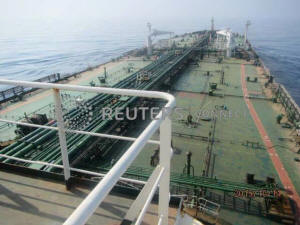Iran oil tanker hit off Saudi coast, may have been missiles: Iran
reports
 Send a link to a friend
Send a link to a friend
 [October 11, 2019]
By Parisa Hafezi and Sylvia Westall [October 11, 2019]
By Parisa Hafezi and Sylvia Westall
DUBAI (Reuters) - An Iranian-owned oil
tanker was struck, probably by missiles, in the Red Sea off Saudi
Arabia's coast on Friday, Iranian media said, an incident that if
confirmed will stoke tension in a region rattled by attacks on tankers
and oil sites since May.
The Sabiti was hit in the morning about 60 miles (96 km) from the Saudi
port of Jeddah, Iranian media reported. The National Iranian Tanker
Company (NITC) said the ship was damaged but stable and denied reports
it had been set ablaze.
The incident, which has yet to be independently confirmed, is the latest
involving oil tankers in the Red Sea and Gulf area, and is likely to
ratchet up tensions between Tehran and Riyadh, long-time regional foes
that have been fighting a proxy war in Yemen, which lies at the southern
end of the Red Sea.
Reports of the incident, which have so far only come from Iranian
sources, offered sometimes diverging accounts. State television, citing
the national oil company, said it was hit by missiles while denying a
report they came from Saudi Arabia.
NITC said "the blasts were probably caused by missile strikes" and said
it was investigating the source, adding that the crew were safe. Iran's
Foreign Ministry said the ship was struck twice, without saying what had
hit the vessel.

State television broadcast images from the deck of the ship saying they
were taken after the attack, but they showed no visible damage. The
sides of the hull were not in frame.
The Red Sea is a major global shipping route for oil and other trade,
linking the Indian Ocean with the Mediterranean via the Suez Canal.
Crude prices jumped on the news and industry sources said it could drive
up already high shipping costs.
There was no claim of responsibility for Friday's reported incident,
which follows attacks on tankers in the Gulf in May and June, as well as
strikes on Saudi oil sites in September.
The United States, embroiled in a row with Tehran over its nuclear
plans, has blamed on Iran for those incidents. Tehran has denied having
a role in any of the attacks since May.
Saudi Arabia had no immediate comment on Friday's reports. The U.S.
Navy's Fifth Fleet, which operates in the region, said it was aware of
the reports but had no further information.
NIOC named the ship as the Sabiti, a Suezmax vessel, after initial
reports said it was the Sinopa. Refinitiv ship tracking data showed the
Sabiti in the Red Sea and heading south under its own power, bound for
Larak, off Iran's southern Gulf coast.
The data put the vessel's draft, or how deeply it sits in the water, at
53%, indicating it is not fully loaded.
[to top of second column]
|

Iran oil tanker hit off Saudi coast, may have been missiles: Iran
reports

PRICE JITTERS
Tensions with the United States have been running high since
Washington withdrew from a deal between world powers and Iran that
aimed to rein in Tehran's nuclear ambitions. U.S. sanctions have
slashed Iranian oil exports, on which Tehran relies.
Russia said it was too early to assign blame for the tanker
explosion. China, the top buyer of Iranian oil, said it hoped all
parties would work to uphold peace and stability in the region.
Iran's ISNA news agency had earlier cited a source saying the
Iranian tanker was struck in a "terrorist" attack.
Oil prices climbed 2% after reports of the tanker incident, with
benchmark Brent and U.S. West Texas Intermediate crude futures both
rising more than $1 a barrel. Brent was trading around $60 a barrel
on Friday. [O/R]
Crude prices had eased after spiking above $70 in response to the
Sept. 14 attacks on Saudi oil sites, which shut down 5.7 million
barrels per day (bpd) of production, about half of Saudi output and
roughly 5% of global supply. Output has since been restored.
Yemen's Iran-aligned Houthi group claimed responsibility for the
Saudi attacks, but a U.S. official said they originated from
southwestern Iran.
Industry sources said Friday's incident off the Saudi coast could
drive up shipping costs, which have already surged.
"War risk insurance premiums for the Red Sea will now likely go up
significantly, as will likely the freight (rates)," said Ashok
Sharma, managing director of shipbroker BRS Baxi in Singapore.
Tanker rates have soared to multi-year highs in recent weeks after
U.S. sanctions on units of Chinese shipping giant COSCO and after
the Saudi attacks.
Disruption to shipping through Red Sea would affect oil passing
through the Suez Canal or SUMED crude pipeline, which has capacity
for 2.34 million bpd and which runs parallel to the canal. It is
used by tankers that cannot navigate the waterway.
(Additional reporting by Catherine Cadell in Beijing, Anton
Kolodyazhnyy in Moscow and Roslan Khasawneh in Singapore; Writing by
Parisa Hafezi and Edmund Blair; Editing by Mike Collett-White and
Alex Richardson)
[© 2019 Thomson Reuters. All rights
reserved.]
Copyright 2019 Reuters. All rights reserved. This material may not be published,
broadcast, rewritten or redistributed.
Thompson Reuters is solely responsible for this content. |